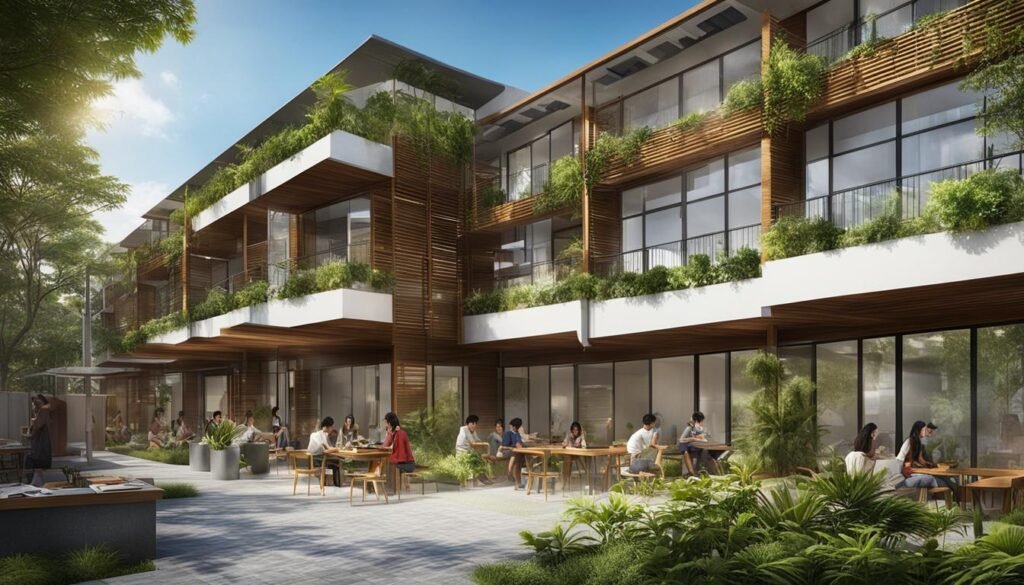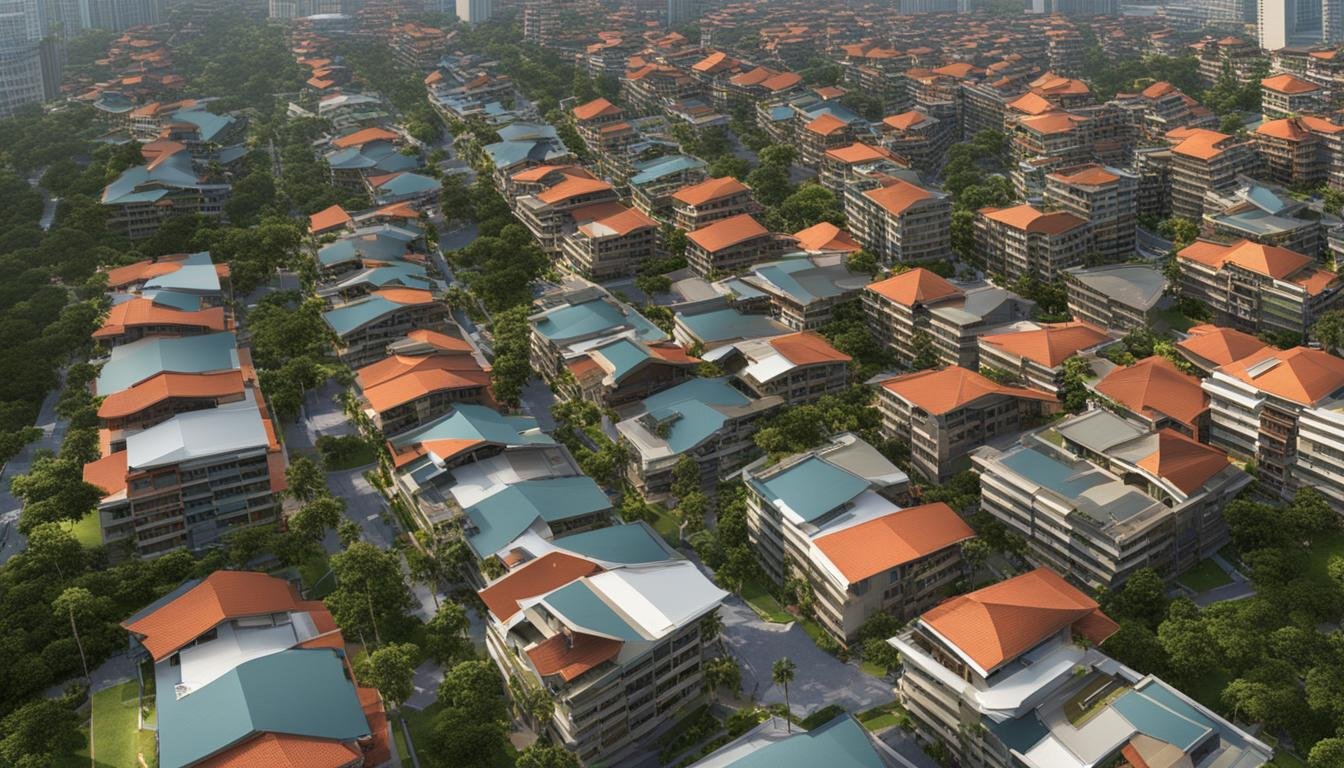Are you a student in the Philippines looking to gain independence and experience a new level of freedom? Moving off campus can provide you with an exciting opportunity to do just that. However, before making the transition, it’s important to consider the housing and financial implications.
When it comes to housing, you’ll need to think about the facilities and accommodation available for college students in the Philippines. While many students choose to rent housing facilities outside of their college, it’s essential to ensure that these options are accessible, sanitary, and safe. Additionally, take note of the challenges that students commonly face in off-campus housing, such as unsatisfactory living conditions and inadequate treatment of boarders.
Financial considerations are also crucial when moving off campus. You’ll need to budget for monthly rentals, as well as expenses for utilities, groceries, and transportation. Assessing your financial resources and creating a realistic budget can help ensure that you’re able to cover all necessary expenses.
Despite the challenges and financial considerations, moving off campus in the Philippines offers numerous benefits. It provides you with the opportunity to gain independence, foster personal growth, and expand your social circle. Additionally, there are resources and support available to help you navigate the process, such as the student affairs office and local government agencies.
Key Takeaways:
- Consider the facilities and accommodations available for college students when moving off campus in the Philippines.
- Budgeting for monthly rentals and additional expenses is essential for a smooth transition.
- Despite challenges, moving off campus can lead to personal growth and expanded social experiences.
- Take advantage of resources and support from the student affairs office and local government agencies.
- Balance work and studies by prioritizing time management and seeking suitable employment opportunities.
Housing Facility and Accommodation for College Students in the Philippines
A study conducted at a state college in the Philippines revealed that the majority of college students opt for off-campus housing arrangements instead of residing within the college premises. Many of these students choose to stay in boarding houses that offer affordable monthly rentals. However, the study also highlighted certain areas of concern regarding the housing facilities and accommodations provided to these students.
The compliance index for student housing facility and accommodation (SHFA) was found to be generally low, particularly in terms of sanitation and cleanliness, as well as safety and security. This raises significant concerns about the living conditions and overall satisfaction of students availing of off-campus housing options.
To address these issues, it is crucial to implement responsive measures aimed at enhancing the housing accessibility and improving the facilities provided to college students in the Philippines. Efforts should be made to prioritize sanitation and cleanliness, ensuring that housing facilities adhere to proper hygiene standards. Additionally, safety and security measures should be strengthened to guarantee the well-being of the students.

Challenges Faced by Students in Off-Campus Housing in the Philippines
Living in off-campus housing presents various challenges for students in the Philippines. These challenges can significantly impact their residential satisfaction and overall living experience.
One of the primary challenges faced by students in off-campus housing is the issue of unsatisfactory living conditions. Many students encounter problems with the quality of their accommodations, such as inadequate sanitation, inadequate cleanliness, and substandard facilities.
Another challenge is the location and accessibility of off-campus housing facilities. Students often struggle to find housing options that are conveniently located near their campus, resulting in difficulties with transportation and increased travel time.
The treatment of boarders is another area of concern. Some students report facing unfair treatment by landlords or boarding house owners, which negatively affects their sense of security and well-being.
Furthermore, students have genuine concerns about sanitation and cleanliness in off-campus housing facilities. Proper maintenance and hygienic practices are crucial for promoting a healthy living environment.

Addressing these challenges is crucial for improving the off-campus housing experience for students in the Philippines. It is essential to enhance the quality of housing facilities, ensuring they meet satisfactory standards of cleanliness, safety, security, and functionality. Additionally, providing fair and respectful treatment to boarders is vital for fostering a conducive living environment.
By addressing these challenges head-on, universities, landlords, and local government agencies can work together to improve off-campus housing options, leading to a better residential experience for students in the Philippines.
Financial Considerations for Moving Off Campus in the Philippines
Moving off campus in the Philippines is an exciting step towards independence and personal growth. However, it’s essential for students to be aware of the financial considerations that come with this transition. Proper budgeting and planning can ensure a smooth and successful experience.
One of the primary financial considerations is monthly rentals. Before moving off campus, students should research the rental market in their desired area and determine the average cost of renting a place. It’s crucial to set a realistic budget and allocate a portion of their income or savings for monthly rent payments.
In addition to monthly rent, students must also consider other expenses such as utilities, groceries, and transportation. These costs can quickly add up and impact the overall budget. It’s advisable to estimate these expenses based on personal needs and lifestyle.
Creating a comprehensive budget is an essential step in managing expenses while living off campus. Students should take into account their income, including any financial aid or part-time job earnings, as well as their fixed and variable expenses. This will help them track their spending and ensure they have enough funds to cover all necessary costs.
It’s important to note that financial considerations may vary depending on the location and type of off-campus housing. Students should carefully assess their financial resources and consider options that align with their budget. This may include sharing accommodations with roommates to split costs or opting for more affordable areas.

By taking the time to evaluate their financial situation and create a realistic budget, students can make informed decisions about moving off campus in the Philippines. While there may be financial challenges, proper planning can lead to a rewarding and fulfilling off-campus living experience.
Benefits of Moving Off Campus in the Philippines
Despite the challenges and financial considerations, moving off campus in the Philippines offers numerous benefits that contribute to a student’s personal and academic development.
One of the significant advantages is gaining independence. Living off campus provides students with the opportunity to make decisions and manage their daily lives without constant supervision. It allows them to develop essential life skills, such as responsibility, problem-solving, and decision-making, leading to increased self-confidence and maturity.
Personal Growth
Moving off campus encourages personal growth in multiple aspects. Students learn to navigate real-world challenges, such as budgeting their finances, managing household tasks, and maintaining a healthy work-study-life balance. These experiences foster resilience, adaptability, and time management skills, all of which are invaluable in their future careers and personal lives.
Social Experience
Living off campus provides students with a broader social experience compared to on-campus living. By interacting with a diverse community of neighbors and fellow students, they can build friendships, network, and cultivate a sense of belonging. These social connections offer valuable support systems, create lasting memories, and enhance the overall college experience.
The benefits of moving off campus in the Philippines extend beyond academic achievements. It offers students a chance to grow as individuals, gain independence, and expand their social horizons. While challenges may arise, the overall personal and academic growth makes the decision to move off campus well worth it.
Resources and Support for Students Moving Off Campus in the Philippines
When it comes to moving off campus in the Philippines, students can rely on various resources and support systems to ensure a successful transition. One valuable source of assistance is the student affairs office at their college or university, which can provide guidance and help in finding suitable off-campus housing options. The student affairs office is equipped with the knowledge and expertise to assist students in navigating the complexities of off-campus living.
Local government agencies can also offer support and information to students moving off campus. These agencies are well-versed in rental regulations and rights, ensuring that students are aware of their rights as tenants and can make informed decisions when it comes to finding affordable and safe housing.

By utilizing these resources, students can benefit from the advice and support of professionals who are dedicated to helping them make the most of their off-campus living experience. Whether it’s providing information on housing options, addressing concerns about rental contracts, or offering financial advice, these resources are designed to ensure that students have the support they need throughout their off-campus journey.
Balancing Work and Studies for Off-Campus Students in the Philippines
Living off campus in the Philippines often comes with the need for students to balance work and studies in order to support their financial needs. It can be a challenging task that requires effective time management and prioritization.
When it comes to managing work and studies, students should prioritize their academic responsibilities while also seeking employment opportunities that allow for a healthy work-study balance. This means finding jobs that offer flexible schedules and understanding employers who recognize the importance of education.
Time management plays a crucial role in achieving a successful work-study balance. Students can utilize techniques such as setting priorities, creating schedules, and breaking tasks into manageable chunks to maximize productivity and ensure that both work and studies receive the necessary attention.
Furthermore, it is essential for students to communicate their academic commitments and limitations to their employers, enabling them to make necessary arrangements and accommodations. This open line of communication can help minimize conflicts between work and study responsibilities.
By finding the right balance between work and studies, students can achieve their financial goals while also excelling academically. It is crucial to prioritize self-care and maintain a healthy work-life-study balance to avoid burnout and ensure overall well-being.
Exploring Employment Opportunities
Students living off campus in the Philippines have various employment opportunities available to them. They can explore part-time jobs, freelance work, or internships that align with their areas of interest and provide valuable work experience.
Local businesses, restaurants, retail stores, and online platforms often offer employment opportunities suitable for students. Additionally, universities and colleges may have student employment programs or job boards that connect students with job opportunities on and off-campus.
When seeking employment, students should consider their schedule, skills, and passions to find jobs that not only provide financial support but also contribute to their personal and professional development. By aligning their employment with their interests, students can further enhance their skills and expand their network.
It is important for students to strike a balance between work and studies, ensuring that work commitments do not overshadow their academic responsibilities. By being proactive, organized, and efficient in managing their time and workload, students can thrive both in their employment and academic pursuits.
Conclusion
Moving off campus in the Philippines involves careful consideration of housing and financial factors. Students need to be aware of the challenges that may arise, including unsatisfactory living conditions and financial constraints. However, with proper planning and support, the decision to move off campus can offer invaluable learning experiences and personal growth opportunities.
It is crucial for students to make use of the available resources and support systems to ensure a successful transition to off-campus living. The student affairs office at their college or university can provide guidance and assistance in finding suitable off-campus housing options. Additionally, local government agencies may offer support and information on rental regulations and rights, helping students navigate through the housing market.
By taking advantage of these resources, students can address any concerns they may have regarding housing and finances. With a well-informed approach, students can overcome challenges and create a fulfilling off-campus living experience in the Philippines.
Source Links
- http://www.ijstr.org/final-print/apr2020/Physical-Social-And-Economic-Conditions-Of-Off-campus-Student-Residences-A-Home-Away-From-Home.pdf
- https://www.journalppw.com/index.php/jpsp/article/download/12289/7966/14739
- https://typeset.io/questions/what-are-some-of-the-challenges-that-students-face-in-off-4zd4te2i9x


